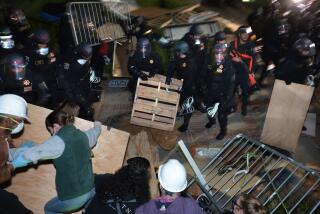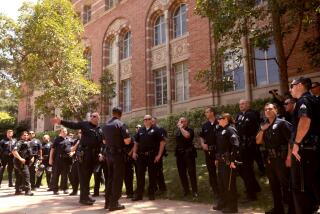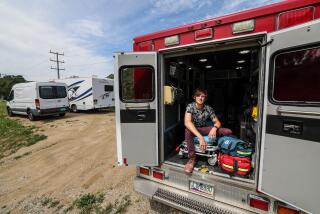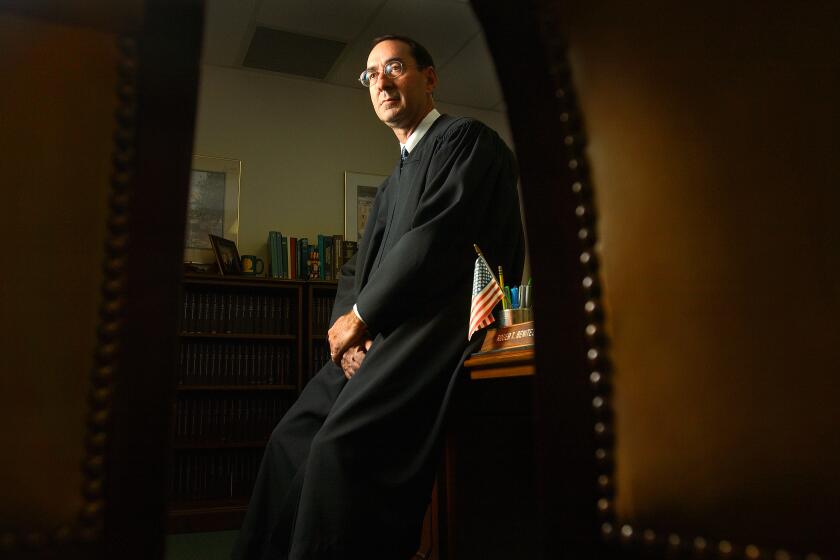Siege is over, but the terror remains
For Sarita Khilnani, it’s the little things -- like the ring of her doorbell Wednesday night -- that suddenly fill her with fear and remind her of the 42 hours she spent locked in her room at Mumbai’s Taj hotel.
Exactly one week earlier, terrorists had blasted their way into the hotel. When the doorbell rang at Room 363 that day, it was by a heavy hand, and followed by furious knocking.
It was 1 a.m. Friday, and Sarita, 32, and her mother, Mira, 62, stood at the door, their hands clasped. They dared not approach the peephole.
“Who is it?” they asked timidly, her mother speaking Hindi. But the voices had moved away and the two were left in silence.
Hours later, mother and daughter emerged from their room and entered the hallway. Room after room had its door broken in. Shards of glass littered the floor, and luggage was strewn about.
Today, Sarita Khilnani and her mother struggle to understand why the five rooms next to theirs were violently emptied, but theirs went untouched.
They are among a handful of Southern Californians who returned from Mumbai this week still shaken by an almost surreal reprieve.
“Why did I get saved?” Khilnani pondered this week, back home in Mission Viejo and trying to sort out her emotions. “Guilty isn’t the right word, but it’s so unfair that we made it out, pretty unscathed, and other poor people, they lost their lives.”
It was supposed to be a happy return to her mother’s hometown, a final mother-daughter vacation before Khilnani’s wedding. But now part of her wedding outfit and the many items bought for the Indian marriage ceremony remain in her luggage in Mumbai. She wouldn’t mind if the items are never returned. “It’s just stuff,” she said.
“We feel really, really, really lucky, we don’t understand how we got out, it’s just a series of so many coincidences,” Khilnani said. “I can’t believe we’re still here. While we were in the room, I was thinking, sometimes we make really big deals about stupid [stuff]. This puts everything in perspective.”
Khilnani has eaten little since her return -- “I haven’t had much of an appetite” -- and her eyes droop with fatigue as she talks about normalcy and coming back home.
On Thursday, Khilnani visited her mother, who has not been able to sleep since the attacks and suffers from a cough exacerbated by the smoke she inhaled in the hotel fires.
“Why didn’t they shoot our door down?” her mother asked her for the hundredth time. “We keep going over the same thing in our head, like it doesn’t make sense why did they not,” her daughter said.
As more details have emerged after the attacks, Khilnani said she has become more nervous and distrusting of people. She wonders if the kind hotel worker who brought her tea in the hotel room was actually an undercover terrorist. Loud noises scare her. “I don’t want to be by myself,” she said. “I travel a lot for work, to Europe or Japan, and I don’t want to travel.”
Khilnani tells the tale, dwelling over the slightest of details from that Wednesday night -- where they sat by the pool for dinner, the slower-than-usual service -- before the events all merge into one long siege in a dark hotel room, drapes drawn, dozing on the floor behind the bed. Every difference is reexamined and what seemed common before she now finds rife with symbolism. Looking back, she is ashamed at her frustration that so few ambulances arrived, and so slowly. She couldn’t understand why the commandos took so long to reach them. But when she stepped out and saw the lustrous marble floor thick with blood, she realized the full scope of the carnage.
“Once we got down and walked out, we understood why it took them so long,” she said.
Like the Khilnanis, West Los Angeles resident Peggi Sturm found herself locked in a Mumbai hotel room during the terrorist attack.
She had traveled to Mumbai with the Synchronicity Foundation, a spiritual group.
As terrorists advanced through the Oberoi Hotel where she was staying, Sturm found herself spending her 64th birthday locked up in Room 1568. For about 36 hours, she said Tibetan Buddhist chants to herself to remain calm. Two of the 25 people in her traveling party were killed and four others injured, one critically.
On Wednesday she gathered with more than a dozen friends in her home. She told her story and they chanted and meditated together for a short time. Friends gave her long hugs. “I’m still here,” she reassured one afterward.
Sturm returned from Mumbai Monday, and has no urge to travel for some time. She has little appetite and said she will never stay in an open-atrium hotel again -- “It’s beautiful, but not safe [from] terrorism.”
Yet Sturm said she feels a new sense of purpose since the attacks. She set up a fund to help some Indians left unemployed by the attacks and urged her friends to be positive.
“Every time you have an angry thought, it adds more anger and evil in the world.”
Meanwhile, Sturm and the Khilnanis are trying not to take things for granted as they return to a new type of normality back home in California.
“On the one hand, it’s good to get back to normal life,” Sarita Khilnani said. “But on the other hand [there’s] this traumatic experience, and now life goes on.
“Even if we hadn’t made it, of course, life still goes on.”
--
More to Read
Start your day right
Sign up for Essential California for news, features and recommendations from the L.A. Times and beyond in your inbox six days a week.
You may occasionally receive promotional content from the Los Angeles Times.






